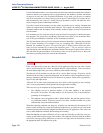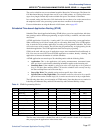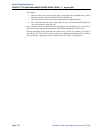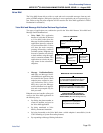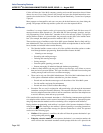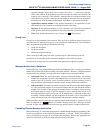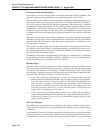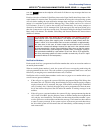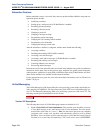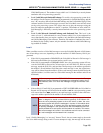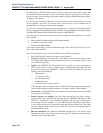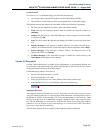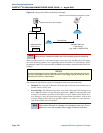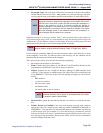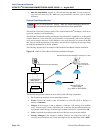
Voice Processing Features
INTER-TEL
®
CS-5200/5400 ADMINISTRATOR GUIDE, ISSUE 1.1 – August 2005
Page 284 Subscriber Features
Subscriber Features
Before subscribers can use voice mail, they must set up their mailbox. Mailbox setup and con-
figuration options include:
• Initializing a mailbox
• Setting up an e-mail password (if E-Mail Reader is enabled)
• Recording personal greetings
• Recording a directory name
• Changing a password
• Changing a message envelope
• Programming remote messaging
• Changing the call screening transfer method
• Programming a fax destination
• Changing the message search order
After the subscriber’s mailbox is configured, mailbox tasks include the following:
• Accessing a mailbox
• Disabling and enabling ASR (if ASR is enabled)
• Accessing voice mail messages
• Accessing e-mail, and fax messages (if E-Mail Reader is enabled)
• Recording and sending voice messages
• Canceling unheard voice messages
• Recovering deleted messages
Instructions for all of the subscriber tasks are located in the endpoint user guides. In addition to
instructions for the tasks listed on the previous page, endpoint user guides contain frequently-
asked questions, guidelines for using ASR, information about using E-Mail Reader, and flow-
charts for the standard voice mailbox and the advanced mailbox.
For the appropriate user guide for voice mail and mailbox information, refer to “Phone User
Guides” on page 6.
Unified Messaging
The Unified Messaging (UM) feature links the voice processing system with e-mail and/or pro-
vides outgoing fax capabilities. The Voice Processing Unit (VPU) uses Unified Messaging ver-
sion 2.2. The Enterprise Messaging (EM) voice processing system uses UM version 2.3. The
following sections provide information on each version.
Version 2.2 Description
The following three levels of Unified Messaging features are included in v2.2.
• Level 1 Voice Mail As E-mail Attachments: This provides users the ability to receive
a Voice Mail message as an e-mail message with a voice attachment. The voice attach-
ment will be in the form of a “wave” (.w av) file that can be played on any computer
equipped with a sound card, speakers, and multimedia software (such as Sound
Recorder). Users can choose to receive the messages as Voice Mail and e-mail (Copy &
Forward) or as e-mail only (Forward Only). The e-mail server can use SMTP\POP3,
NOTE Unified Messaging is not supported in Basic Voice Mail (BVM).



